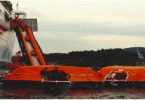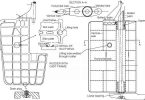As it is known that growing worldwide movement to require the use of Ultra and Low sulfur fuels with viscosity even less than 2 cSt at 40’C. Use of low sulfur, low viscosity fuel has the potential for several harmful effects on diesel engines. Along with these requirements, many vessels have encountered several harmful of equipment or difficulties to start the Main engine during maneuvering.
Root cause for above:
- Low viscosity -Reduced effectiveness as a lubricant of this type of fuel. The lower viscosity will reduce the film thickness between the fuel pump plunger and barrel and in the fuel valves, leading to excessive wear and possible sticking, causing failure of the fuel pumps and fuel valves. Excessive wear is leading to fuel pumps leakage.
- Low Density: Low sulfur, low viscosity fuels typically have low density when compared to heavy fuel oils. This will result in less energy per volume of fuel and thus will require more fuel volume to be supplied to the engine to maintain equivalent power. This can be a problem with 4 stroke engines where the difference in output per unit volume of fuel delivered to the engine can be on the order of 6 to 15 percent when also considering the increased leakage in fuel pumps. Engine governors and automation need to be able to adjust to the changes in fuel rack position and governor settings. This situation is aggravated on older engines with worn fuel pumps.
- Insufficient Fuel pump pressure: The pressure in the fuel pumps must be sufficiently high to open the fuel valves and achieve fuel injection and, thereby, combustion. Worn fuel pumps increase the risk of starting difficulties because the fuel oil pump pressure needed for injection cannot be achieved. On Main engines and GenSets, an indication of the fuel pump wear can be achieved by reading the actual fuel pump index and compare it with the test-bed measurements. As a rough guideline, is consider the pump worn out for HFO operation when the index increase is 5-10, or more, under the same conditions as during sea trial.
Recommendation to reduce or to eliminate these harmful potential effects:
- Keep viscosity above 2cSt and fuel temperature less than 40’C.
- Worn fuel pumps should be overhauled or worn parts to be replaced for better engine performance, sufficient spares are kept on board for replacement at sea, if needed.
- After each fuel oil change over from HFO to LSMGO
- Each Diesel Generator engine to be tested for smooth start, if the engine does not start, the starting index in the governor must be adjusted, rack or linkage limitation to be readjusted; fuel pumps to be overhauled a.s.a.p.
- Aux. boiler to be tested for smooth starting and proper air adjustment. To be readjusted if it is required
- Main engine-prior arrival to pilot station, in safe operation area, start, stop and reversing check to be carried out. Above operation to be recorded in the log books;
If the engine does not start, the starting index in the governor must be adjusted, rack or linkage limitation to be readjusted, fuel pumps to be overhauled a.s.a.p.




